Battle of the Briefs
“The defendant moves the court for entry of an Order dismissing the portions of the plaintiff’s Amended Complaint as more specifically outlined in paragraphs (c) and (d) of the “Therefore” clause of said Amended Complaint. Plaintiff cannot establish as a matter of law that the defendant violated the provisions of the United States Constitution; N.C.G.S. § 15A-282, N.C.G.S. § 15A-903(a)(1) and N.C.G.S. § 15A- 903(a)(2); or the June 22, 2006 Order."
“Notably absent from the list of what [Nifong contends] cannot be established is a violation of the provisions of [Rule 3.4 (d)(3) and] Rule 3.8(d) of the Revised Rules of Professional Conduct, the former of which is included in paragraph ( c ) and the current, included in paragraph (d). It’s difficult to imagine that Nifong genuinely expects the State Bar to dismiss charges based on violations of its Rules of Professional Conduct based on a claim that the transgression doesn't violate other provisions included alongside those rules.”
NIFONG DOES NOT SEEK DISMISSAL OF THE ALLEGED VIOLATIONS OFTHE RULES OF PROFESSIONAL CONDUCT
As a preliminary matter, the only claims upon which "relief may be granted" in this proceeding are those involving the Rules of Professional Conduct, as the DHC is a tribunal of limited authority. See N.C.G.S. § 84-28.1 (2007). In his motion to dismiss, Nifong does not argue that Plaintiff failed to allege sufficient facts to support the claim that Nifong violated the Rules of Professional Conduct as alleged in paragraphs (c) and (d) of the "Therefore" clause of the Amended Complaint. Nifong challenges the claims set forth in paragraphs (c) and (d) of the "Therefore" clause on grounds that the State Bar allegedly cannot establish that Nifong violated the United States Constitution, various sections of the North Carolina General Statutes, or two Durham County Superior Court Orders.
Plaintiff's substantive claims in paragraphs (c) and (d) are that Nifong violated Rules 3.4 and 3.8 of the Rules of Professional Conduct. A violation of Rule 3.4 occurs where a lawyer fails "to make a reasonably diligent effort to comply with a legally proper discovery request by an opposing party." The former version of Rule 3.8, which was in effect until November 16, 2006, required a prosecutor to "make timely disclosure to the defense of all evidence or information known to the prosecutor that tends to negate the guilt of the accused." A prosecutor's compliance or non-compliance with statute, constitutional provision, or court order is not determinative of whether disclosure under former Rule 3.8 was "timely." In order to prove a violation of Rule 3.4 or the former version of Rule 3.8, it is not necessary to show that the lawyer violated any statute, constitutional provision, or court order. Thus, the viability of the claimed Rule violations in paragraph (c) and in paragraph (d)(ii) are wholly independent of Plaintiff's additional allegations that Nifong's conduct also violated the U.S. Constitution, the General Statutes, and the Court Orders.
For the foregoing reasons, the allegations contained in paragraphs (c) and (d)(ii) of the "Therefore" clause of Plaintiff's Amended Complaint state claims or violations upon which relief can be granted and Defendant's motion to dismiss should be denied as to paragraphs (c) and (d)(ii).”
“In its Amended Complaint filed herein on January 24, 2007, the North Carolina State Bar (hereinafter "Plaintiff or "State Bar") alleges that Michael B. Nifong (hereinafter "Defendant" or "Nifong") violated various provisions of the Revised Rules of Professional Conduct, the United States Constitution, North Carolina statutes, and a court order. Specifically, as concerns this Motion to Dismiss, the North Carolina State Bar in paragraph (c) and (d) of the"therefore" clause, contends that, Mr. Nifong violated Rules 3.8 (d) and 3.4 (d) (3) by:
a) by failing to make timely disclosure to the defense of all evidence of information known to him in a timely manner; (Amended Complaint, p. 30, paragraph (c))
b) failing to make a reasonably diligent effort to comply with a legally proper discovery request; (Amended Complaint, p. 30, paragraph (c))
c.) never providing to the Duke Defendants on or before November 16, 2006 a report setting forth results of all test or examinations conducted by DSI and a memorialization of Dr. Meehan's oral statement to him of their meetings; (Amended Complaint, p. 30, paragraph (c)); and
d.) failing to disclose evidence or information that he knew or reasonably should have known was subject to disclosure. (Amended Complaint, p_ 30, paragraph (c)).”
"A prosecutor's compliance or non-compliance with statute, constitutional provision, or court order is not determinative of whether disclosure under former Rule 3.8 was "timely." In order to prove a violation of Rule 3.4 or the former version of Rule 3.8, it is not necessary to show that the lawyer violated any statute, constitutional provision, or court order. Thus, the viability of the claimed Rule violations in paragraph (c) and in paragraph (d)(ii) are wholly independent of Plaintiff's additional allegations that Nifong's conduct also violated the U.S. Constitution, the General Statutes, and the Court Orders."
In United States v. Agurs, a case ironically cited by Defendant Nifong’s attorney’s in support of his Brief, the Court clearly distinguished between the higher ethical standard of a “ prosecutor's obligation to serve the cause of justice” and the lower standard required to ensure a fair trial by going so far as to note that this higher obligation is “of no special significance” in determining whether a conviction shall be overturned. The separate standards required to meet constitutional and ethical obligations are made quite clear by the Agurs court.
"Nor do we believe the constitutional obligation is measured by the moral culpability, or the willfulness, of the prosecutor. If the suppression of evidence results in constitutional error, it is because of the character of the evidence, not the character of the prosecutor."
“This court now holds that Rule 3.8(d) contains a materiality standard requiring a prosecutor to disclose exculpatory, outcome-determinative evidence that tends to negate the guilt or mitigate the punishment of the accused. We further hold that, to fulfill the “timely” disclosure requirement, if evidence is material to the outcome of the trial, then the prosecutor must disclose that evidence in advance of the next critical stage of the proceeding – whether the evidence would particularly affect that hearing or not.”
“Material evidence, in this sense, is any evidence tending to be outcome determinative at trial. However, materiality itself is not time-sensitive, and does not come and go depending upon the nature of the next hearing. We do not accept the argument that the evidence need only be disclosed in advance of a proceeding at which that evidence would be specifically determinative. Rather, we conclude that if evidence is material to the outcome of the trial, then the prosecutor must disclose that evidence in advance of the next critical stage of the proceeding – whether the evidence would particularly affect that hearing or not.”
“For our purposes, therefore, the important thing is that, although a critical stage of the proceedings was about to occur, the respondent made a conscious decision to delay disclosure in both cases until after those proceedings concluded.
“Under the respondent’s approach, both the judge and defense attorney were unaware of the actual strength or weakness of the prosecution’s case at the preliminary hearing, which could have an unfair effect on, for example, the conditions the court might place on a defendant’s pretrial release, and also on the defendant’s plea-bargaining position. We therefore hold that, when a prosecutor is aware of exculpatory evidence before any critical stage of the proceeding, she must disclose that evidence before the proceeding takes place.”
"Paragraph (d)(i) of the "Therefore" clause of the Amended Complaint alleges that Nifong violated the current version of Rule 3.8(d), which requires a prosecutor to "after reasonably diligent inquiry, make timely disclosure to the defense of all evidence or information required to be disclosed by applicable law, rules of procedure, or court opinions including all evidence or information known to the prosecutor that tends to negate the guilt of the accused." The only one of Plaintiff's claims to which the arguments contained in Nifong's motion to dismiss are conceivably relevant is the allegation in Paragraph (d)(i). Nonetheless, the allegations in the Amended Complaint, taken as true, demonstrate that Nifong was required, under either "applicable law, rules of procedure, or court opinions" to provide a complete report to the Duke Defendants of all tests performed by DSI and a memorialization of Dr. Meehan's oral statements. Accordingly, and for the specific reasons discussed below, Defendant's motion to dismiss should also be denied as to Paragraph (d)(i) of the "Therefore" clause of the Amended Complaint."
“Mr. Nifong’s brief in support of HIS motion to dismiss insists that he did not violate the Duke Three’s constitutional, statutory and/or court-ordered rights, because there has not been a trial date set, much less a trial.
“But, as I wrote before Election Day 2006:
“The Duke Three's constitutional rights to due process and equal protection rights were flagrantly violated and the Duke Three have been irreparably prejudiced: but for the violations, they would not have been indicted.”
“Mr. Nifong acknowledged “the seminal case of Brady v. Maryland, 373 U.S. 83…(1963)” and the United States Supreme Court’s holding in that case that “the suppression of this evidence [by a prosecutor] was a violation of the Due Process Clause of the Fourteenth Amendment,” but argued that he had not committed a constitutional violation, based on a misreading of United States v. Agurs, 427 U.S. 97 (1976).
“Nifong Brief: “The Agurs Court discussed the interchange between that duty and a defendant’s right to due process in the context of prosecutors making decisions both pretrial and during trial about what information, if any, to give to defense counsel, and judges then being called upon ‘to decide whether a nondisclosure deprived the defendant of his right to due process.’... Significantly, the Court noted that while a prosecutor may make improper omissions in failing to disclose information, the prosecutor will have breached his constitutional duty to disclose only if there has been a constitutional violation of the defendant’s right to a fair trial. In the absence of a trial, then, there can be no constitutional violation of the defendant’s right to a fair trial, and therefore no breach of the prosecutor’s constitutional duty to disclose. ‘[T]he prosecutor will not have violated his constitutional duty of disclosure unless his omission is of sufficient significance to result in the denial of the defendant’s right to a fair trial.”
“BUT, as the North Carolina statute makes clear, that determination can be made without a trial and justify a pre-trial dismissal.
“Obviously the United States Supreme Court did not intent to insulate willful prosecutors from punishment because their willful misconduct was discovered before
trial!”
ABRAMS: That was Kerry Sutton on this program yesterday. David Freedman, a lot of defense attorneys are making a lot of the fact that there were searches conducted yesterday of the rooms of the two young men who were arrested. Is that really that big a deal that they were continuing with their investigation?
FREEDMAN: Well, it's not. I mean to me the bigger deal was when they went to try to interview the people that were represented, knowing they had attorneys and didn't bother to contact their attorneys.
ABRAMS: They're allowed to do that. The authorities are allowed to do that, aren't they?
FREEDMAN: Well, I mean I believe at this point you've got a Sixth Amendment right that attaches and once they know they're represented by counsel, they need to contact their counsel. They can execute search warrants. Certainly they can always do that...
ABRAMS: They can always go up to someone and say hey I want to talk to you and if the person says I've got a lawyer, then they've got to leave them alone, but they're allowed to go up to them, right, and say hey, I want to ask you some questions.
FREEDMAN: Well, I think if they had been sent in by the prosecutor to do it, you've got some questions too about trying to interview someone, having contact through that by a represented party and again I call into question the ethics of that.
Leading in that same direction, is the curious employment of the Brady rule as if it has never been addressed by the Supreme Court outside of the context of a trial. On at least one occasion, in United States vs. Ruiz, has Brady been discussed by the US Supreme Court in the context of pre-trial discovery. In Ruiz, the Supreme Court noted a clear distinction between evidence of factual innocence and other types of Brady material with regard to discovery issues outside of a trial and a prosecutors ongoing duty to disclose - the distinction appearing to be that disclosure of evidence of factual innocence fell under the purview of a prosecutor's ethical duties as a safeguard against prosecution of innocents while other Brady material might be viewed differently.
“The court discussed whether Brady v. Maryland required disclosure outside of the context of a trial. United States v. Ruiz, 536 U.S. 622 (2002). The due process clause does not require pre-guilty plea disclosure of impeachment information, however, “Ruiz indicates a significant distinction between impeachment information and exculpatory evidence of actual innocence.” [McCann v. Mangialardi , 227 F.3d 782 (7th Cir. 2003)]
"The prosecutors’ proposed plea agreement contains a set of detailed terms. Among other things, it specifies that “any [known] information establishing the factual innocence of the defendant” “has been turned over to the defendant,” and it acknowledges the Government’s “continuing duty to provide such information...
“This Court has said that due process considerations include not only (1) the nature of the private interest at stake, but also (2) the value of the additional safeguard, and (3) the adverse impact of the requirement upon the Government’s interests. Ake v. Oklahoma, 470 U.S. 68, 77 (1985). Here, as we have just pointed out, the added value of the Ninth Circuit’s “right” to a defendant is often limited, for it depends upon the defendant’s independent awareness of the details of the Government’s case. And in any case, as the proposed plea agreement at issue here specifies, the Government will provide “any information establishing the factual innocence of the defendant” regardless.” [United States v. Ruiz]
Considering that countless men and women have been exonerated by DNA evidence far less compelling than that which Nifong conspired to withhold, it is difficult to imagine that the evidence in question could not be construed as evidence of factual innocence thereby falling under his continuing duty to disclose and not merely as an issue of whether a right to a fair trial was violated.
For their part, the prosecutors for the State Bar kept their arguments far simpler.
“First, Nifong argues that the "allegations of the Amended Complaint establish that the defendant did in fact provide the 'Duke lacrosse defendants,' through discovery, a report of the results of all tests and examinations performed by DSI as of October 27, 2006." (Emphasis added). This statement mischaracterizes the factual allegations of the Amended Complaint. In the paragraphs of the Amended Complaint cited by Nifong in support of this argument, the State Bar alleges that Nifong provided the Duke Defendants with "1,844 pages of underlying documents and material" (paragraph 254), "documentation" (paragraph 259), and "results and evidence" which had been expressly excluded from the DSI report provided by Nifong (paragraph 261). The 1,844 pages of raw data provided to the Duke Defendants by Nifong were not a "report" of the results of all tests and examinations performed by DSI; they were the results themselves, without the benefit of summary, explanation or interpretation by the State's expert. As such, the allegations in the Amended Complaint do not, Nifong contends, establish that he provided the Duke Defendants with a "report" of DSI's tests and examinations.
"Second, Nifong argues that because the Amended Complaint “fails to allege… that a trial was held or that a trial date had been scheduled,” the State Bar “cannot establish that the ‘Duke lacrosse defendants”[sic] due process rights to a fair trial were affected.” Nifong cites no legal authority for this proposed bright-line rule. According to Nifong, because his ongoing refusal to disclose exculpatory evidence to the Duke Defendants occurred before a trial date was set, the defendants’ right to a fair trial was not compromised and thus, Nifong did not violate their constitutional rights. This argument conflates the issue of whether a constitutional violation occurred with the issue of whether such a violation is grounds for reversal of a conviction….Defendants contention that he was under no obligation to provide the information because no trial date was set necessarily implies that he was entitled to withhold and never disclose potentially exculpatory information in any case that settled prior to trial.”
To support their arguments, the State Bar attorneys note the smoke and mirror trick employed by Nifong as he attempts to misconstrue three cases (Elliot, Spivey, Agurs) that he cited in his defense.
"The state Supreme Court in Elliot (and previously in Berry) indicated that even where a Brady violation (i.e. suppression by the prosecution of evidence favorable to the accused) occurs, it may not constitute reversible error if the State provides the exculpatory evidence to the defendant sufficiently in advance of trial. See also State v. Spivey, 102 N.C. App. 640, 646, 404 S.E.2d 23, 26 (1991) ("While we strongly disapprove of delayed disclosure of Brady materials, that alone is not always grounds for reversal."). Conversely, the fact that a constitutional violation does not require reversal of a conviction does not mean the violation did not occur."
"A careful reading of United States v. Agurs does not support Nifong's argument that he didn't violate the Duke Defendants' constitutional rights. The portion of the Argurs decision quoted by Nifong in his motion is inapposite to Nifong's conduct as alleged in Plaintiffs Amended Complaint. In Agurs, the U.S. Supreme Court carefully distinguished between situations in which the defendant makes either a generic request for exculpatory matter or no request at all, and instances "in which specific information has been requested by the defense." 427 U.S. at 106. Where the defendant doesn't request discovery or requests unspecified exculpatory information, the Court held that "the prosecutor will not have violated his constitutional duty of disclosure unless his omission is of sufficient significance to result in the denial of the defendant's right to a fair trial." 427 U.S. at 107.
In contrast, where a defendant's request "[gives] the prosecutor notice of exactly what the defense desire[s]," and the subject matter of [the defendant's] request is material, or indeed if a substantial basis for claiming materiality exists, it is reasonable to require the prosecutor to respond either by furnishing the information or by submitting the problem to the trial judge. When the prosecutor receives a specific and relevant request, the failure to make any response is seldom, if ever, excusable.
"Id. The Duke Defendants made repeated, specific requests to Nifong for material potentially exculpatory information, so under the Argurs analysis, his conduct falls into the "seldom, if ever, excusable" category. Accordingly, the facts as alleged in Plaintiff s Amended Complaint are sufficient to support the allegation that Nifong violated the due process clause of the U.S. Constitution."
Part II of Nifong’s brief, “NO VIOLATION OF DISCOVERY RULES OR COURT ORDER,” appears to rest on equally shaky ground. Each of the three sections of Part II assert a “no harm, no foul” premise which ignores several factors while asking the State Bar to condone his actions because after he was found out he finally did what he should have done in the first place.
These factors include:
- As demonstrated by the most recent defense motion and the State Bar‘s reply to his motion to dismiss, Nifong’s compliance with discovery rules and court orders remains incomplete; and
- Nifong’s partial compliance, which he describes as complete, occurred only after his multiple attempts at avoidance through deception, including misrepresentations to the court as alleged in other parts of the Amended Complaint and the State Bar‘s reply to his Motion to Dismiss; and
- Nifong’s partial compliance, which he describes as complete, occurred only after his multiple attempts at avoidance through delay, in opposition to his ethical mandate to provide timely discovery; and
- The Amended Complaint does not allege violations of Rules 3.4 and 3.8 because he violated discovery rules and court orders but rather alleges that he violated Rules 3.4 and 3.8 in addition to violating discovery statutes and court orders.
The State Bar's response to Defendant Nifong's assertions in Part II of his Brief appears emboldened by a firm disbelief in Nifong's childlike "I don't recall the meeting" excuse and a confident rejection of his contradictory explanations and denials with regard to the conspiracy to withhold DNA evidence. Whether this emboldened confidence stems from the rumored recent meeting between Dr. Brian Meehan and the State Bar prosecutors or from other confirmation of the timing and substance of Nifong's communication with his expert witness remains to be disclosed but the balance of the State Bar's reply appears to be absent any doubt in their position and intention.
Dr. Meehan was a witness for the State, and during his meetings with Nifong in April and May 2006, he made various oral statements regarding the results of DSI's DNA testing on evidence in the criminal case against the Duke Defendants. Pursuant to § 15A-903(a), Nifong was required to provide to the defense "witness statements . . . results of tests and examinations, or any other matter or evidence obtained during the investigation." "Oral statements" were required to be "in written or recorded form." Plaintiff's Amended Complaint alleges that Nifong failed to provide the Duke Defendants, at any time, with a memorialization of Dr. Meehan's oral statements during the April and May 2006 meetings with Nifong. Unlike subsection (a)(2), which indicates that the State must "furnish the materials required by this subsection within a reasonable time prior to trial, as specified by the court," subsection (a)(1) does not link the time at which the State must provide discovery materials to the time of trial. Accordingly, the State Bar's allegation that Nifong never provided a memorialization of Dr. Meehan's statements to the Duke Defendants is sufficient to support a violation of Rule 3.8(d) regardless of whether or not a trial date had been scheduled. In light of the plain language of § 15A-903(a)(1), this allegation is sufficient to state a claim upon which relief can be granted...
"Under § 15A-903(a)(2), the issue is not whether a defendant is able to surmise—from a massive amount of raw data—whether the expert uncovered potentially exculpatory evidence, but whether a "report of the results" was furnished to the defendant by the State. Again, the 1,844 pages of raw data provided to the Duke Defendants by Nifong, more than five months after he provided the 10-page DSI report, were not a "report" of the results of any examinations or tests performed by DSI; they were the results themselves, without the benefit of summary, explanation or interpretation by the State's expert. Consequently, the State Bar's allegation that Nifong eventually provided the Duke Defendants with "the underlying data contained in the DSI file" in no way conflicts with the State Bar's claim that Nifong violated subsection 15A-903(a)(2)...
"In addressing Nifong's specific contentions regarding compliance with the Court's Orders, it is worth noting that the content of each Order was based on Nifong's misrepresentations to the Court as alleged in the Amended Complaint. Therefore, Nifong is effectively arguing that he can make false statements to a court which result in the entry of an order, and then use the order that is based on his misrepresentations to claim he committed no discovery violation...
"The June 22 Court Order did not specifically require Nifong to provide a memorialization of Dr. Meehan's oral statements because Nifong had repeatedly misrepresented to the Court that no additional discoverable material had been discussed, and that the requested memorialization would be redundant with the DSI report already provided to the defense...
"Based on Nifong's misrepresentation that "Dr. Meehan said nothing during those meetings beyond what was encompassed in the final report of [DSI] dated May 12, 2006," the Court found that there were no additional discoverable statements by Dr. Meehan for the State to produce. Based on his continuing misrepresentations, the Court did not specifically order Nifong to provide the defense with memorializations of Dr. Meehan's oral statements. In his motion, Nifong now seeks to have a claim that he violated the Rules of Professional Conduct dismissed on the grounds that his successful deception of the Court resulted in a Court Order which did not specifically require him to provide memorializations of Dr. Meehan's statements.
"The allegations in the Amended Complaint involve the content and timing of information provided by Nifong to the subjects of the NTO, not the "format" in which the disclosures were made. Section 15A-282 is unambiguous: Anyone subject to an NTO must be given any report of test results as soon as such a report is available. DSI's testing was complete, and thus a report of all the results—including the potentially exculpatory DNA test results—was available on May 12, 2006. The fact that Nifong only directed Dr. Meehan to prepare a partial report does not mean that a comprehensive report was unavailable: Such an assertion is tantamount to declaring that suppressed evidence simply does not exist. From May 12 through October 27, 2006, the only information provided by Nifong to the subjects of the NTO regarding DSI's DNA testing was the ten-page report containing only "positive" results.
"Even if one were willing to assume for the sake of argument that the 1,844 pages of underlying data provided to the Duke Defendants on October 27 was a "report," the information contained therein had been available since May 12, and was not given to the Duke Defendants until more than five months later pursuant to a motion to compel over an objection. The State Bar has alleged that Nifong never provided the subjects of the NTO with a full report of test results as required by the statute. Whether or not one is willing to characterize the 1,844 pages of data as a "report," which it is not, the allegations of the Amended Complaint show that Nifong did not provide the subjects of the NTO with a report of all tests results "as soon as the reports [we]re available" as required by N.C.G.S. § 15A-282. He also never provided this data to the remaining 43 players subject to the NTO.
"Defendant's motion seeks to have the DHC conclude that it violates none of the Rules of Professional Conduct for him to:
"(1) discuss and be keenly aware of potentially exculpatory DNA test results and direct or agree that those results would not be contained in a report provided to indicted defendants and other named suspects, and
"(2) successfully and repeatedly deceive courts into entering orders finding falsely that he had had no previous discussions about these potentially exculpatory DNA test results, because ...
"... over five months later and pursuant to a court order to compel, he ultimately provided the defendants almost 2,000 pages of underlying data without any report. In essence Defendant argues that, court orders and very specific discovery requests notwithstanding, he had absolute discretion to withhold potentially exculpatory information of which he was fully aware until some unspecified time prior to trial without violating the Rules of Professional Conduct. Defendant's contention that he was under no obligation to provide the information because no trial date was set necessarily implies that he was also entitled to withhold and never disclose potentially exculpatory information in any case that settled prior to trial. These precepts, if accepted, would apply not only to Defendant but to all other prosecutors and must be rejected."
Defendant's conduct, as set forth in the Amended Complaint, violates Rule 3.4 and the previous version of Rule 3.8, and certainly states a violation under the current Rule 3.8 and the State's open file discovery statutes. For the foregoing reasons, Defendant's motion to dismiss should be denied."
In conclusion, Nifong’s Brief and the Motion it supports may be better understood if we remind ourselves of Nifong’s Theory of Defense Motions .
“Their way of trying a case in the media is not to call press conferences, but to simply file motions and court papers that contain outrageous or false statements and assume that people will report them as if they were facts.”
Given that his Brief and Motion appear to be more of a public relations effort than a substantive legal filing, it would appear that Nifong is following his own advice.
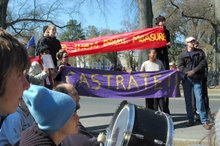




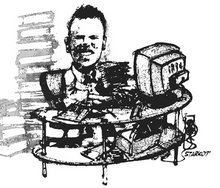
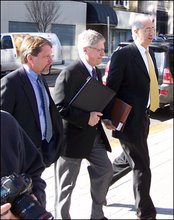
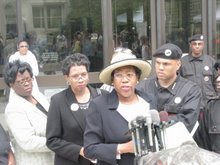
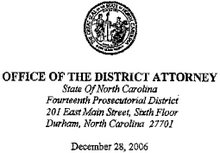
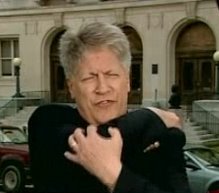

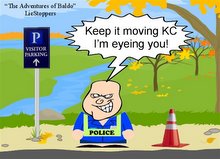



















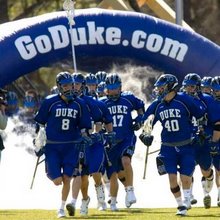

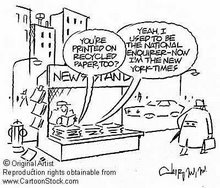

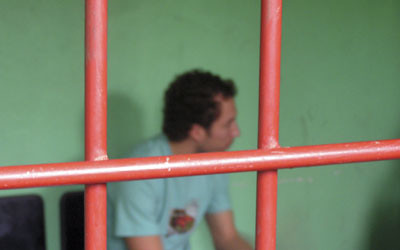
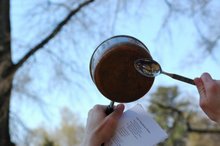


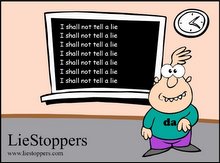






6 comments:
Goodbye you crooked, a-hole, loser! I hope you rot in hell and it damn sure looks like the bar is gettin' ready to send you there on a one way ticket! Come on enabler scum, post up how this is all nothing and how poor Mikey is being mistreated by these yankee Devil Dookies. STFU all you losers. I'm sure the SPs have taken notice of this too. Look for them to be piling on soon with the dropping of all the charges against the players and recomendations for charges against the Fong, his evil henchmen and the lying sack of crap whore. ENOUGH_ END THE PLAYER'S NIGHTMARE NOW !
8:06 How do you really feel? LOL
Nifong must be feeling sick tonight. The State Bar response is astounding! KC & Liestoppers have both responded with excellent articles.
I suspect Nifong knows he is going to get his butt kicked and is putting forth a criminal defense. Nobody is buying it. He frame three guys and withheld exculaptory evidence!
The bar investigators may indeed have obtained additional information from Meehan in their recent meeting, but I don't think it was necessary for them to have new information in order to prove that Meehan made oral statements to Nifong that Nifong was required to memorialize in writing and disclose to the defendants.
In the December hearing, Meehan testified that Nifong knew about the DNA from the multiple other non-LAX males, and that he and Nifong had discussed not including that information in Meehan's report. Nifong himself, in one of his media interviews after that December hearing, admitted that the non-LAXer male DNA was exculpatory evidence that should have been disclosed, but argued that he was trying to protect the anonymous non-LAXer males' "privacy" interests by withholding it.
Since Meehan's report never mentioned the non-LAXer males' DNA, how and when did Nifong learn about it? We know he knew about it before Meehan wrote his report, because both Meehan and Nifong have admitted that they discussed putting only "positive" matches in the report, and withholding the other results (in order to protect the "privacy" interests of the other DNA sources).
Nifong clearly learned about the non-LAXer DNA during his discussions with Meehan. Yet when asked in court about these discussions, Nifong told the judge that he had only discussed with Meehan what was contained in his report, and how the state would use that information at trial. Nifong told the judge he had no obligation to write up a disclosure of Meehan's oral statements to him, because everything they talked about was already in the report, and the report had been disclosed to the defense, so therefore any write-up of Meehan's oral statements to him would be redundant.
That was obviously a lie.
Carolyn says:
I downloaded and read the Bar's response to Nifong. It is so clear they are furious with him. They don't mince words, they don't beat around the bush, they let him have it right between the eyes. He broke the law. And he broke it in order to frame three innocent young men for a rape that never happened.
To quote an anonymous poster on KC's site - "Put a fork in Nifong. He's done."
Delta Dawn - Original Words and Music by Alex Harvey and Larry Collins
CHORUS
Mike Nifong, what's that flower you have on?
Could it be a faded rose from days gone by?
And did I hear you say
Group 88 was a-meetin' you here today
To take you to their mansion in the sky-eye?
He's seventy-one and his wife still calls him "baby"
All the folks 'round Durham say he's crazy
'cause he walks downtown in his bathrobe with a plan
Lookin' for a mysterious mustached man
In his younger days they called him "The Nifong"
Most arrogant DA you ever laid eyes on
Then a gal of low degree stood by his side
Promised him she'd never never lied
CHORUS
CHORUS
CHORUS
CHORUS
Seems to me that legitimate law enforcement types would also be pushing for Nifong's ouster. From now on, when the police ask someone to cooperate -- "Talk to us. If it looks like you didn't do anything, your cooperation will be rewarded" -- those people may just clam up and say "Look what happened to the lacrosse captains when they cooperated."
Post a Comment